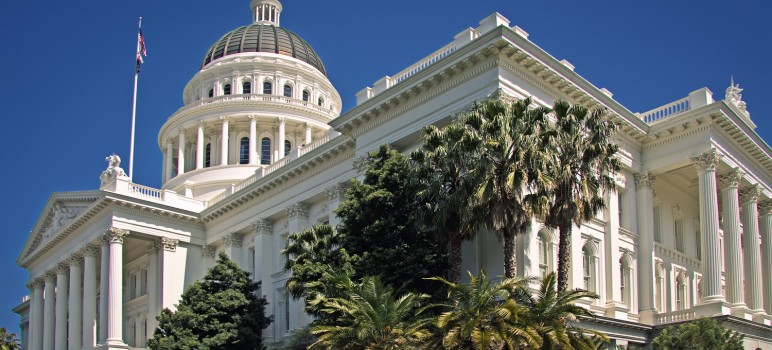Opponents of Gov. Gavin Newsom’s $6.4 billion plan to build mental health treatment beds and housing today conceded that his ballot measure, Proposition 1, is likely to pass.
“We almost took down the bear, but it looks like we will fall short,” the opposition campaign said in a written statement. “Today, as the principal opponents of Proposition 1, we concede that it is almost certain to pass.”
Proposition 1 is a two-part ballot initiative. It includes a bond to build treatment facilities and permanent supportive housing for people with mental health and addiction challenges. It also proposes changes to a longstanding tax on personal incomes over $1 million, known as the Mental Health Services Act, by requiring counties to spend 30% of that revenue on housing instead of other services.
As of noon Tuesday with more thant 5.8 million votes counted, about 80% of the total ballots, the measure was leading by a margin of more than 40,000 votes, 50.4% to 49.6%.
Newsom has previously said Prop. 1 will help California fulfill a decadeslong promise to get “people off the streets, out of tents and into treatment.”
The Yes on Prop. 1 campaign amassed a nearly $21 million war chest for the ballot measure, drawing support from law enforcement groups, major healthcare organizations and the mental health advocacy group NAMI California.
In contrast, the opposition campaign raised very little money. Opponents are led by clients of mental health services and some small mental health agencies who worry their programs could lose funding if the measure passes. Others, including the Howard Jarvis Taxpayers Association, opposed the measure because of its cost.
Jon Coupal, executive director of the Howard Jarvis Taxpayer Association, said the close election showed that Californians were concerned about government spending.
“This has two strikes. No. 1, it was a bond measure. People are sensitive right now to government debt. A lot of people had the reaction of, I’m all for helping the homeless but do we really need a bond to do this?
“Then secondly, I think people are well aware of the billions of dollars we have thrown at homelessness and mental health and the problem just seems to get worse, so I think people may look at that and say, you’re asking for more money and you’re not demonstrating any results,” he said.
What does Prop. 1 promise?
The dual bond measure and change to California’s so-called “millionaire’s tax” are Newsom’s attempt to increase the state’s mental health and addiction treatment capacity and get people living in encampments into stable housing.
The number of unhoused Californians had ballooned to 181,000 people in 2022 during the most recent point-in-time count, a 60% increase over the past decade. New research from UCSF estimated that more than 21,000 homeless people currently experience hallucinations. Meanwhile, the number of acute care mental health hospital beds decreased by at least 30% between 1995 and 2016, according to the California Hospital Association.
The bond measure is supposed to build a combined 11,150 treatment beds and housing units with some set aside for veterans.
Where will the money go?
Money raised by the bond would be funneled into two existing state programs: the Behavioral Health Continuum Infrastructure Program and Project Homekey.
The behavioral health program would get a $4.4 billion infusion to build 6,800 in-patient mental health and substance use disorder treatment beds.
The Department of Health Care Services will award grants to counties and local organizations to construct, acquire and expand treatment capacity. To date the department has awarded more than $1.6 billion to a variety of programs including crisis care and children’s facilities as part of a pre-existing budget investment.
Project Homekey would get $2 billion to build 4,350 units of supportive housing for people with mental health and addiction challenges. A little more than half of the units will be reserved for homeless veterans.
Project Homekey is an extension of Newsom’s pandemic-era efforts to house people living in encampments during the height of the COVID-19 pandemic. The state budget previously gave the Department of Housing and Community Services $736 million to convert hotels, motels and other buildings into housing.
How much will it cost?
Bonds allow government agencies to borrow money and repay debt over time. Prop. 1 is estimated to cost $310 million annually over 30 years, totaling $9.3 billion, according to the nonpartisan Legislative Analyst’s Office. Payments would be made from the state general fund.
California is facing state budget cuts for the second consecutive year with some estimates projecting a $73 billion dollar shortfall.
Newsom has made mental health a signature issue. If Prop. 1 passes, it would represent another milestone in his overhaul of California’s behavioral health system.
Last year, Newsom signed a law easing restrictions on California’s decades-old’ conservatorship law, which limits who can be placed in involuntary treatment programs.
In 2022, his signature mental health push established a special court system to compel people with untreated mental health and addiction challenges into treatment programs.
And in 2021, Newsom poured more than $4 billion in one-time funds into children’s programs to address rising suicide rates and overdoses among youth.
A coalition of small mental health organizations, disability advocates and current clients of county mental health programs opposed Prop. 1. They argued that the measure would increase the amount of involuntary treatment and divert money from local organizations that serve hard-to-reach populations, such as LGBTQ people and communities of color.


baaaaaahahaha
you marks
when are you ever gonna learn money only makes this problem worse
all you are doing is expanding this pig trough, where all these NGO CEOs and their social worker Masters degree’d coffee fetchers do is buy second homes and rent two bedroom apartments (for their ‘office’)
this money will only serve to create more entitled silo dwellers
you are so gullible